
Presents a summary of:
VOLOKOLAMSK HIGHWAY
by
Aleksandr Bek
(1944)
True story of one batallion's fight against the Nazis
as well as their own fears
in the early stages of the Defense of Moscow.
MAN WITHOUT A SURNAME
This tale is told by Baurjan Momysh-Uly, a second-lieutenant from southern Kazakhstan. He fought with the famous Panfilov's Division, which repelled the Nazi attempt to reach Moscow along the Volokolamsk Highway.
"Baurjan" is his given name. "Momysh-Uly" means "son of Momysh". He has no surname.
Baurjan hates lies and promises to cut off the author's hands if he writes anything untruthful.
|
|
In early October 1941, Baurjan and his battalion are in the marshes of the Leningrad region, about 25 miles away from the front. They are suddenly, and without explanation, shipped eastward. They detrain in the forest near the town of Volokolamsk, about 80 miles west of Moscow. Baurjan is disappointed, thinking he is being kept in the rear. He does not know that the Germans have already cut through the line guarding Moscow. He does not know that only four days earlier, Hitler had broadcast, "The Red Army has been destroyed; the road to Moscow is open."
Baurjan's battalion is assigned the defense of a five-mile stretch of the Ruza River, about 20 miles from Volokolamsk. If the enemy ever does reach this point, Baurjan assumes that five or ten battalions will join him to defend this stretch.
The Ruza River is shallow and easy to cross. At one point on the western bank, the forest extends practically to the water's edge, perfect for an enemy to hide in.
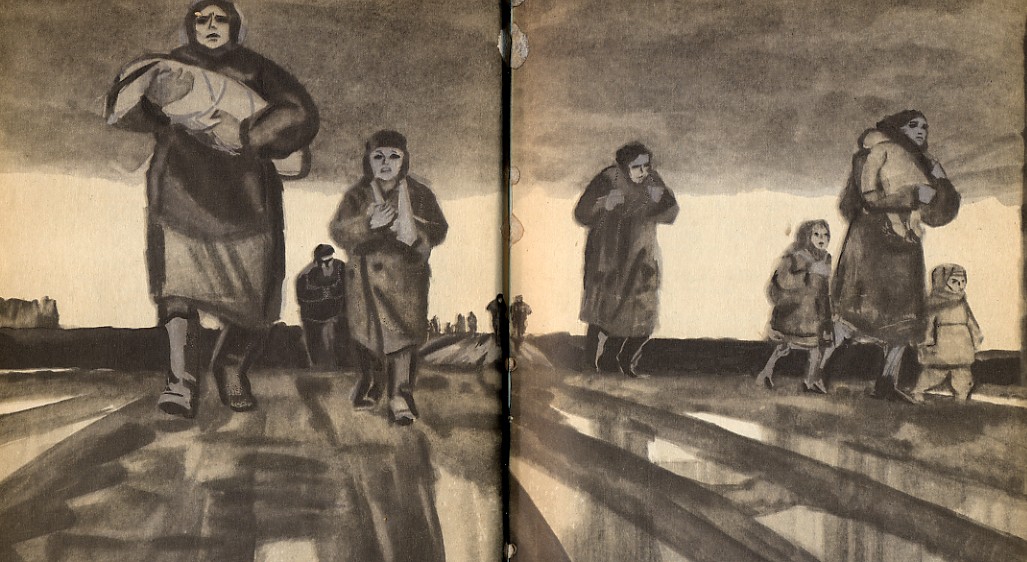 The next day, streams of refugees pass through the area. Among them are bedraggled Soviet soldiers who had broken out of Nazi encirclement near Vyazma. They are extraordinarily rag-tag, some with rifles, some without, and lacking in discipline. Baurjan wants these "vagabonds in soldiers' uniforms" arrested as deserters.
The next day, streams of refugees pass through the area. Among them are bedraggled Soviet soldiers who had broken out of Nazi encirclement near Vyazma. They are extraordinarily rag-tag, some with rifles, some without, and lacking in discipline. Baurjan wants these "vagabonds in soldiers' uniforms" arrested as deserters.Snow is falling. Baurjan tours the defenses. He comes upon one machine gun nest. Most of the machine-gunners are nearby eating. To test their readiness, Baurjan fires the machine gun and raises a false alarm. Instead of rushing to the machine gun, the men start running away to the forest. They soon feel shame, however, and return to their post. Only one soldier--Barabayev--does not come back.
"JUDGE ME!"
Julmuhamed Boszhanov, a machine-gun company political officer, reports to Baurjan that Barabayev has been found. And what's more--Barabayev has shot himself in the hand.
Baurjan denounces Barabayev as a coward and traitor. A firing squad is formed out of the men in Barabayev's own unit. On Baurjan's order, Barabayev is executed.
"TO LIVE, NOT TO DIE!"
The troops dig trenches and engage in target practice. They seem glum, dispirited. Baurjan remembers the words of the General, Ivan Vasilyevich Panfilov: "The soldier goes into action to live, not to die!"
Baurjan listens to political officer Dordia speaking to the troops. Dordia keeps stressing that the men have to be willing to give up their lives, to die, for the native land. Baurjan doesn't like this emphasis on "death".
Baurjan talks to the men. He asks if they want to live. They all respond, "Yes". But, Baurjan points out, wanting to live is not enough. They have to shoot well, dig their trenches well, throw hand grenades accurately. In conclusion, Baurjan says:
"The enemy is out to kill you and me. So I am compelled to order you to kill them. And you, too must tell your comrades to kill for the sake of our precious native land. You are the native land! We, our families, our mothers, our wives and children are the native land....I want to lead you into battle not to die, but to live!"
GENERAL IVAN VASILYEVICH PANFILOV
Baurjan's chief of staff, Rakhimov returns from a reconnaissance mission and reports that the Germans are only 20 miles away, in and around the village of Sereda.
Unexpectedly, General Ivan Vasilyevich Panfilov arrives. He accepts Baurjan's report, and approves of Barabayev's execution.
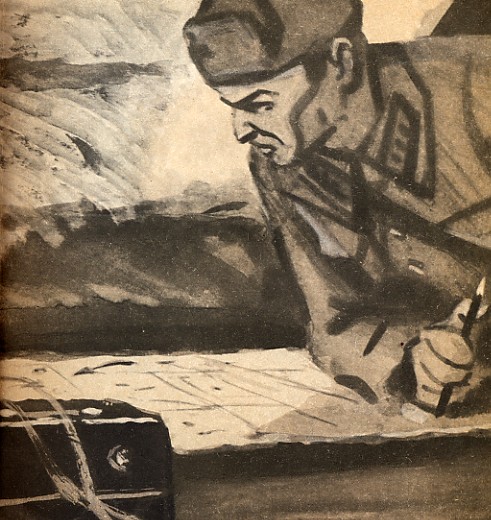 Reviewing the strategic situation with Baurjan and his commanders, Panfilov tells them that they have been reinforced with several anti-tank artillery regiments. Their main task now is to use these guns against the Germans at the point of main attack.
Reviewing the strategic situation with Baurjan and his commanders, Panfilov tells them that they have been reinforced with several anti-tank artillery regiments. Their main task now is to use these guns against the Germans at the point of main attack.A samovar is brought in, and Panfilov himself makes the tea.
Panfilov tells Baurjan that he must withdraw one or two of Baurjan's companies. And furthermore, with this reduced battalion Baurjan must defend not a five-mile stretch of the river, but six miles. He must defend more with less.
Panfilov expects that they will eventually have to retreat from this spot and try to keep the enemy bottled up between here and Volokolamsk. Despite this assessment, Panfilov also suggests that Baurjan make plans for offensive thrusts against the Germans.
THREE MONTHS EARLIER
In July 1941, Baurjan was an instructor at the Kazakhstan Military Commissariat in Alma-Ata. Panfilov, who had been the Military Commissar of Kirghizia, was given the task of forming a new division, and Baurjan is assigned to him.
Baurjan found that while Panfilov has a very easy-going nature and style (no shouting), he is still a very strict commander.
LYSANKA AND A HORSY TALE
Panfilov gives Baurjan a divisional horse named Lysanka. Baurjan recalls a lecture he was given by a senior officer when he, Baurjan, was a blustery junior officer unable to maintain discipline among his men. The senior officer said a good commander is like a good horseman, who spends innumerable hours training his horse to respond to his every slight motion or shift of weight.
|
|
THE TOBACCO MARCH
After about a week of training, Baurjan takes his battalion on a 30-mile march. The men learn a hard lesson about the importance of packing and carrying their equipment properly. Baurjan also must be stern to ensure that everyone keeps pace.
|
People's Enemy? 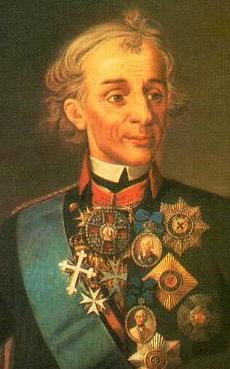 He smashed the Turks! He smashed Pugachov! Read the: Military Biography of A.V. Suvorov |
When they arrive at their destination, the men are exhausted and expect to be fed. Instead, Baurjan has the food distributed raw to the men and orders them to make their own meals. Most men spoiled more food than they ate. Baurjan, stressing the importance of this training, quotes an old maxim of Aleksandr Vasilyevich Suvorov: Hard in training, easy in battle!"
On the march back, the men pass through the fields of a tobacco plantation. Men start dropping like flies overcome with fumes from the tobacco plants. Baurjan demands that they ignore their illness and march in proper formation.
By the end of the march, the men show a significant improvement in bearing and discipline.
"BAD, COMRADE MOMYSH-ULY"
Now, three months later, on the banks of the not-yet-frozen Ruza River, Panfilov tours the trenches with Baurjan. Panfilov reprimands Baurjan for having prepared no temporary bridges or rafts. After all, it might prove advantageous to move forward and make a stab at the Germans first.
Panfilov orders comrade Sevryukov, the commander of the second company, to regroup on the flank. Sevryukov's company carries out the order quickly and efficiently, which greatly pleases Panfilov. The general then gives a short speech to the men, saying, in part:
|
|
Before departing, Panfilov says that to become a true battalion, the men are lacking only one thing: a stab at the Germans. He advises Baurjan to watch for a chance to strike first.
Baurjan sends small groups of soldiers out across the river with orders merely to get a look at the enemy and come back. This mission excites and emboldens the men. Two of then even shoot and kill a German they see stealing a pig from a woman.
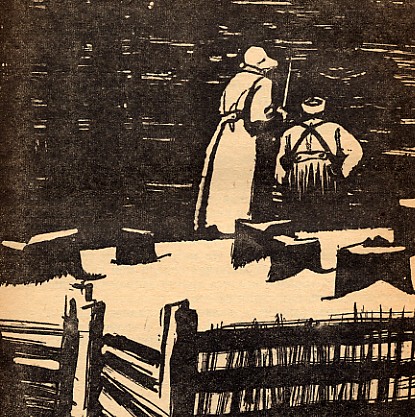 TRY, IF YOU DARE
TRY, IF YOU DAREThe village of Sereda is used as a supply depot for Nazi troops moving through the village to Kalinin and Mozhaisk. Baurjan decides to make a preemptive attack on Sereda. On the night of 13 October he assembles 100 men and tells them:
"The enemy is only terrifying until you actually get to grips with him. Go, comrades, find out what the Germans are made of. Will they bite the dust before our bullets and bayonets?"
The raid is successful. Petrol and ammunition dumps are burned, and about 200 Germans are killed. Also, the raiding party returns with captured horses, sledges, motorcycles, and one prisoner. The prisoner says the Germans intend to have breakfast in Volokolamsk and dinner in Moscow. The Soviet soldiers laugh at this arrogance.
The men no longer fear the Germans. They had seen the Germans run, had heard them scream as they killed them, had pierced the enemy's hide with bullet and bayonets.
Baurjan thinks that his battalion has now become a genuine bulat, a Damascus blade, tempered, elaborately chased, which would cut through iron and from which nothing in the world could efface the chased design.
PART TWO
On 16 October 1941, with gunfire being heard about 15 miles away, Baurjan lies in his dug-out, thinking. After all, General Panfilov had often said, "The main duty and the main job of a commander is to think, think, and think."
Anticipating the tactics the Germans will use then they advance, Baurjan gets the idea to plan an ambush on the rear of the German column when it advances. Unfortunately, Baurjan, has insufficient forces to execute such a plan.
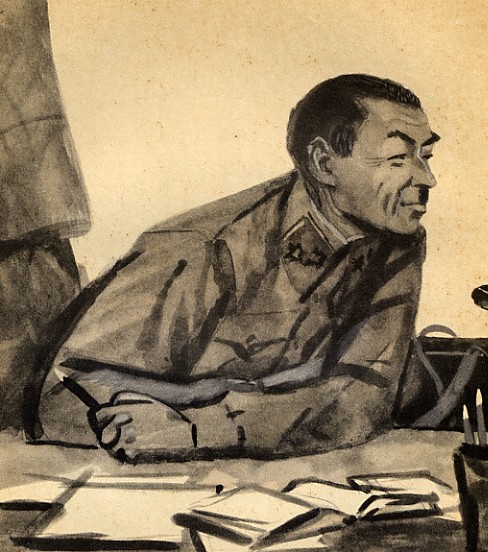 ONE HOUR WITH PANFILOV
ONE HOUR WITH PANFILOVBaurjan is summoned to meet with Panfilov at a nearby village. A reserve battalion has been brought up to defend the sector next to Baurjan's. The men in this new battalion are poorly trained and disciplined. The old commander has been removed and replaced by a 27-year-old Captain Shilov
Panfilov tells Baurjan to station outposts in the 10-mile strip of no-man's land between the river and the Germans. These outposts can harass the Germans when they advance, slowing them down. The most important task is to keep the Germans off the main road into Volokolamsk. Panfilov also instructs Baurjan to dig dummy positions so as to fool the Germans.
THE BATTLE ON THE ROAD
Baurjan decides to place lieutenants Brudny and Donskikh in charge of the reinforced platoons which are to harass the Germans in the no-man's land. He explains the mission to them: They are to take cover near the road, dig in, and hold on, not permitting the German motorized columns and artillery to move along the road. Small reconnoitering parties are to be left unmolested, but if a column comes, they must attack from ambush. They should kill as many of the Germans as possible, then wait and let the enemy deploy, go into action, and send out forces to encircle them. Then Brudny and Donskikh must slip away and come out on the road on another spot from where they can attack again, repeating the whole process.
Things are quiet until 20 October. Donskikh calls from his hidden position to report that a column of German lorries is advancing without even reconnoitering, without patrols, without flank guards. Donskikh's platoon opens fire on the Germans, killing about 100 and sending the rest running.
The Germans regroup and blast Donskikh's position with a two-hour mortar barrage. Then the Germans try to outflank the Donskikh's group. The Soviets fire back, holding the Germans at bay. At dusk, the Germans take their dead and withdraw.
That night, Donskikh's platoon changes its position.
"YOU GAVE UP MOSCOW!"
The next morning, the Germans begin advancing along the second road in the no-man's land, toward Brudny's hidden position. This time, they at least have the sense to send out patrols first; but then, thinking that the road is clear, the column comes forward without flank guards. Brudny's platoon opens fire, and again the Germans flee in a panic-stricken mob, forgetting orders and discipline.
During the action, the telephone line between Brudny and Baurjan goes dead. Baurjan sends some men out to find the break in the line. Soon they return with distressing news: Germans fired on them from a village on the road. Baurjan is worried that Brudny's platoon might have been encircled. But then he receives even more distressing news: Brudny and his men have broken out of encirclement and returned safe and sound to camp.
|
|
ANOTHER BATTLE ON THE ROAD
Baurjan considers himself partially responsible for the rout of Brudny's platoon. After the first ambush, the Germans had altered their tactics and were ready for the second one. Baurjan had failed to foresee this.
Donskikh is summoned for an urgent meeting with Baurjan, where they discuss new strategy. In the event that the Germans repeat their tactics of the previous day and try to cut off Donskikh's line of retreat, Donskikh's men are to run away, looking disordered and panicked. The Germans will pursue. Donskikh's platoon will then split into two groups, and hide in the ravines on the side of the road. When the pursuing Germans get between the two groups, Donskikh's men will open fire in a second ambush.
The next morning, Brudny returns to camp, carrying the tommy guns and papers of two Germans he has killed. Baurjan agrees to let him back into the battalion, putting him in charge of the reconnaissance patrol.
Later that day, the Germans move a column up the road past Donskikh's position, and another battle begins. Initially, Baurjan's strategy works well. When the Germans are caught in the cross-fire, they begin to flee in a panic. But then the Germans recover their senses and charge directly at the ambushing Soviets. Here, the German numerical superiority (200-to-25) is the deciding factor. Donskikh receives seven bullet wounds before his men manage to drag him away.
That is how the Germans got control of the no-man's land.
OCTOBER TWENTY-THIRD
At two minutes past nine on the morning of 23 October, the German's begin an artillery bombardment of Baurjan's battalion, obviously in advance of an attack. The bombardment lasts for hours, directed by a German "Humpback" spotter plane flying overhead. The shells hit mainly "dummy defenses" which Baurjan had ordered. The troops suffer relatively few casualties.
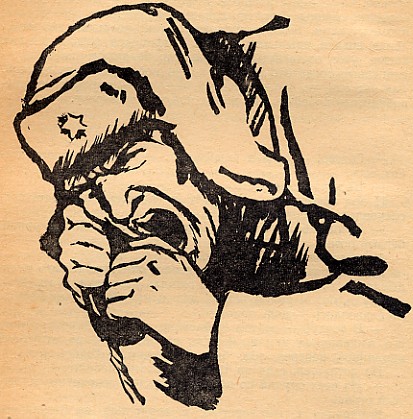 Around four in the afternoon, Sevryukov, the commander of the second company, crawls out to an observation post and espies German forces massing in the forest at the edge of the forest. Baurjan decides that now is the time for his eight artillery pieces to come to life. The first two ranging salvos are fired. Sevryukov and Lieutenant Kubarkenko, the artillery spotter, are phoning in target corrections when they are smashed with a direct hit by German artillery.
Around four in the afternoon, Sevryukov, the commander of the second company, crawls out to an observation post and espies German forces massing in the forest at the edge of the forest. Baurjan decides that now is the time for his eight artillery pieces to come to life. The first two ranging salvos are fired. Sevryukov and Lieutenant Kubarkenko, the artillery spotter, are phoning in target corrections when they are smashed with a direct hit by German artillery.Baurjan races over to the second company. He has a telephone line run up to the top of a church belfry where he and Kubarenko go to resume calling in the artillery target corrections. The Soviet guns score a direct hit on the German troops.
But Baurjan's belfry position is spotted by the "Humpback" plane. It bears down on the tower, firing its machine gun furiously. It gets so close that Baurjan and the pilot gaze into one another's eyes. Then German artillery direct their fire at the belfry.
Assuming that the German attack is imminent, Baurjan goes to the company headquarters dugout. Boszhanov has assumed command in place of the wounded Sevrukov. The German attack doesn't begin. It had been repulsed before it began by the smashing blows of the Soviet artillery.
Instead, the Germans renew the artillery assault, targeting the belfry and the revealed Soviet artillery. It was the seventh hour of the barrage.
OCTOBER TWENTY-THIRD - AT THE CLOSE OF DAY
The bombardment stops. The regimental commander calls Baurjan with news: the Germans have broken through in another sector and are advancing on Baurjan's position, not from the front, not from across the river, but from the flank and the rear, where there are absolutely no prepared defenses
Baurjan calculates that the only way to save the battalion is to surrender the village of Novlyanskoye and try to stop the Germans further down the road. He races over to No. 2 company and organizes a withdrawal, leaving Boszhanov and some machine-gunners behind with orders to cover them until they turn their flank.
The troops leave Novlyanskoye and dash across a field towards some woods. The Germans are moving fast, bearing down on them and firing as they come. Baurjan had ordered the men not to bunch up, but, gripped by fear and surprise, that is exactly what they do. Discipline is beginning to disintegrate. Baurjan has to act fast. The Germans are only 400 yards away.
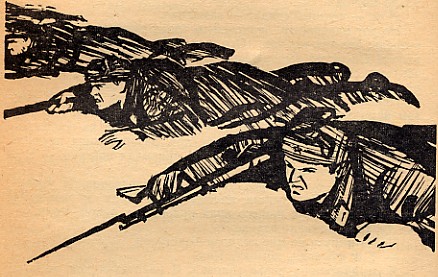 Baurjan orders the men to halt, lie flat, and fire at the Germans, who are already in Novlyanskoye. Unfortunately, the Red Army men's shooting isn't very accurate. But just then, Baszhanov's machine-gunners open fire, mowing down Germans. The rest of the Germans quickly lie down flat.
Baurjan orders the men to halt, lie flat, and fire at the Germans, who are already in Novlyanskoye. Unfortunately, the Red Army men's shooting isn't very accurate. But just then, Baszhanov's machine-gunners open fire, mowing down Germans. The rest of the Germans quickly lie down flat.Then the Germans are subjected to an attack from the flank and the rear. A platoon of 50 Red Army men lead by Lieutenant Islamkulov charges at them. The Germans hurriedly reform into an arc. Baurjan's men prepare to join the charge. The first to jump up to lead the charge--Burnashev--shouts out, "For home and country! Forward!" But by this time, the Germans have brought up two machine guns, and Burnashev is immediately gunned down...as is the second soldier to join the charge. Baurjan feels it is his duty to rally the men and starts to jump up to charge; but Tolstunov, a regimental propaganda instructor, quickly yanks Baurjan down to safety.
|
|
The Germans break their orderly ranks and flee pell-mell. Pursing the Germans, Baurjan's men and Lieutenant Islamkulov's platoon move back into Novlyanskoye.
WE'RE HERE!
The Red Army charges back into Novlyanskoye. The Germans who manage to get away wade to the other side of the river or run off in the direction of Krasnaya Gora.
Baurjan orders Lieutenant Zayev to lead the company out of the village again and dig in across the field in the line from which they had charged.
Baurjan then returns to his headquarters dug-out to assess the situation. It is not good. Captain Shilov is there, dejected. His battalion has been routed. Which means that the front on Baurjan's right and left were both breached. There are also Germans in the direction of the exposed rear. However, there still remains a narrow passage leading through to the main Red Army forces. Baurjan's battalion is caught in a noose.
As it grows dark, Zayev calls to report that the Germans have moved back into Novlyanskoye and are settling in for the night. Also, it seems that they are working to build a new bridge across the river.
Communications with regimental headquarters is cut off, so Baurjan doesn't know what do to. Everyone expects him to order a withdrawal. Instead, remembering Panfilov's words that defense of the road was most important, he says they will stay on and fight in encirclement
He orders Brudny to take the reconnaissance patrol and search all nearby villages and hamlets. His mission is to find the relocated regimental headquarters and return with orders.
In the meantime, the troops are to dig in in the woods, setting up defenses on the fringes. Baurjan orders the artillery to fire directly at the Germans in Novlyanskoye, which is only 700 yards from the guns, just to let the Germans know, "We're here!"
IN THE FORESTER'S CABIN
Baurjan transfers his battalion HQ to a forester's cabin in the woods. There he assembles his officers and gives orders:
1. We will fight in encirclement until we receive orders to withdraw. Each man must work through the night to dig himself a full depth fire-trench;
2. No one is to surrender and no prisoners are to be taken. Cowards are to be shot on the spot;
3. Be sparing with ammunition. Take rifles and cartridges aware from the dead and wounded. Fire until the last bullet but one. Keep the last bullet for yourself;
4. The artillery is to fire only point-blank directly at a living target. Fire until the last shell but one. The last shell is to be used to blow up the gun.
|
|
Preparing for the worst, Baurjan decides that the last line of defense will be the forester's cabin itself. If they are overrun, Baurjan will kill all the wounded, so they won't fall into the hands of the Germans. Then Baurjan will kill himself.
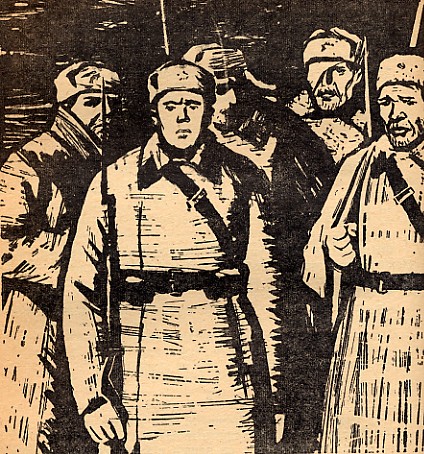 EIGHTY-SEVEN
EIGHTY-SEVENBoszhanov's mission is successful. He returns with the abandoned artillery and 400 shells. Following him are 87 stragglers from Shilov's battalion who were hiding in the woods in ones and twos. They ask to join the battalion, but Baurjan, denouncing them as deserters, will have nothing to do with them. He orders packed off to divisional headquarterst. The stragglers beg and plead, and Boszhanov supports them, offering to serve as their commander. Baurjan relents and gives them a mission. They are to sneak into Novlyanskoye from the rear, wipe out the Germans and set fire to the trucks and the new pontoon bridge.
The Germans have posted sentries facing the woods, not the river, so they are unprepared for this sneak attack from the rear. Also, the silly Germans are sleeping in beds and in haylofts in their underwear. It was not a battle, it was a massacre. Boszhanov brings back a present for Baurjan: a pair of powerful German field-glasses.
MORNING
Brudny's returns with orders from the regiment--they are to retreat to the woods outside the village of Dolgorukovka and await further orders.
When Baurjan's troops get to Dolgorukovka, they are met by Lieutenant Kurgansky assistant to the regimental chief of staff. He informs Baurjan that his battalion is to join the rest of the Soviet troops which are withdrawing the 20 miles back to Volokolamsk, the key point that blocks the highway to Moscow.
Baurjan decides to spend the rest of the night here, giving the men and horses time to eat and rest before departing. In the meantime, he orders Boszhanov to take his unit of stragglers back to the woods to retrieve the six artillery pieces and 400 shells which they had hidden near Novlyanskoye.
Around eight o'clock the next morning, battles begin about three or four miles from Baurjan's position on both flanks. The Germans have launched a tank attack, and the Soviet artillery is pounding the panzers. Baurjan would love to withdraw immediately, but Boszhanov has still not returned, so he orders the company commanders to get ready for circular defense.
AT THE CROSS-ROADS
Boszhanov finally shows up with the artillery pieces. But the men in his unit, having learned that all other units have withdrawn are grumbling discontentedly. They mutter disrespectfully about Baurjan, and Baurjan commits the unforgivable sin of not chastising this insolence immediately. As a ghastly consequence, within a few minutes blood would be shed which need not have been shed.
Baurjan rides up to the top of a hill to survey the situation. He sees German panzer tanks entering a village up ahead. Down below on the road is Baurjan's No. 3 company, lead by Lieutenant Filimonov. Unaware of the situation in the village, Filimonov is leading his men directly toward the village, right into the clutches of the Germans.
Baurjan whips up his horse and gallops as fast as he can to catch up with Filimonov. He reaches them in time and sends them back.
Baurjan's orderly, Sinchenko, races up. He reports that when Baurjan started galloping down the hill, the stragglers in Boszhanov's unit started shouting "The Battalion Commander's running away!" and they took to their heels.
Galloping back to the main unit, Baurjan finds that, in order to quell the panic, Boszhanov shot and killed two of the deserters. Baurjan orders him to shoot again without warning, if anyone else starts running.
The battalion is now in an angle between two German columns. Tanks are coming down the highway. Following them in two streams come trucks, motorcycles, tractors--infantry, artillery and ammunition carriers--the main spearhead of the German army on their way to Volokolamsk. And along the dirt road, moving toward the highway, streamed the transport of the auxiliary group that had broken through the day before.
A traffic jam is developing at the cross-roads. Baurjan orders the artillery to open fire on the cross-roads. Trucks explodes, and German troops make a mad dash for cover.
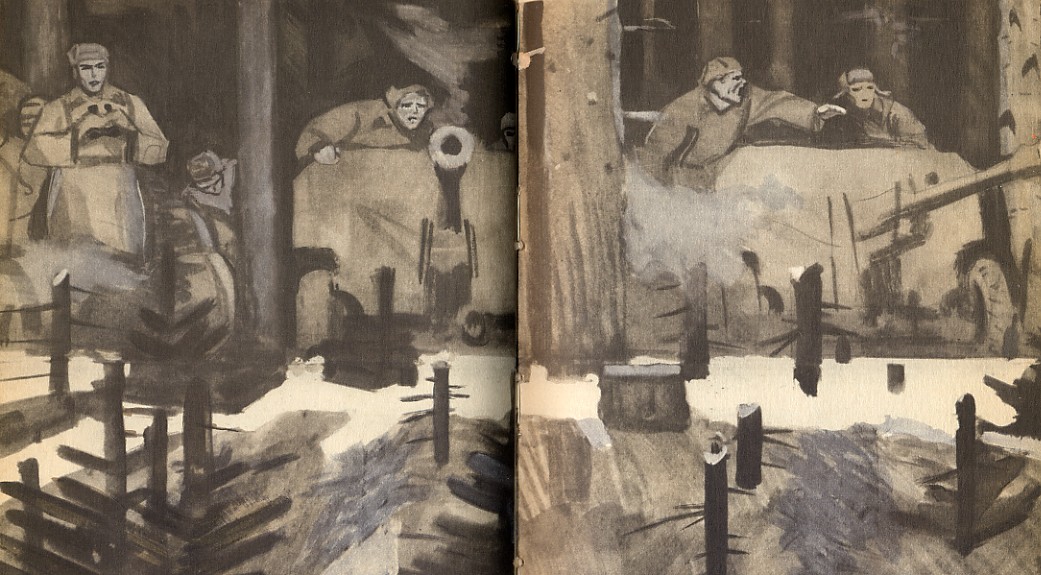 WILL THE RIFLES SAVE US?
WILL THE RIFLES SAVE US?Baurjan's artillery pounds the road, causing a massive traffic jam among the German columns and forcing them to slow down the hoped-for Blitzkrieg. Baurjan keeps changing the location of the guns, to keep the Germans guessing. Miffed, the Germans call in planes to bomb the forest where Baurjan's troops are entrenched. But it is the horses that suffer most: fourteen dead horses, two smashed guns, and six wounded men. Another battle is raging ten miles to the north, in the direction of Volokolamsk; but Baurjan's actions here are preventing German reinforcements from getting through.
Three times the Germany infantry launch attacks on Baurjan's troops, but each time they are beaten back.
When darkness falls, the Germans try to resume traffic on the road, but the battalion's artillery does not let them do so.
Finally, between nine and ten at night, a messenger from Panfilov arrives, ordering Baurjan to withdraw immediately to Volokolamsk.
Since there are Germans on all the roads, the only way to Volokolamsk is through a narrow strip of forest. Seventy saws and 150 axes all set to work to clear a path for the heavy guns.
As morning dawns, the battalion reaches a glade running across their path. From there a dirt road leads to the highway, and the road is held by the Germans. Passing along the road is the stream of traffic which Baurjan's artillery had stemmed on the main road the day before.
To get to the forest on the other side, the battalion will have to cross this 1000-yard-wide glade. But how? After much thought, Baurjan devises a risky strategy. The battalion will take up a diamond formation, one rank deep, with the wagons and guns inside the diamond. The battalion is then to advance at a moderate pace, keeping its diamond formation. The men are to trail their rifles, prepared for action, and at the command, fire in volleys as they advance. They are not to fire into the air or the ground, but directly at the enemy. The battalion gets into formation and starts to move into the glade.
At first, the Germans can't figure out what's going on, so the Soviets advance 100 yards without incident. Finally, a German officer starts shouting, and German troops start dashing for their weapons. Baurjan gives the order: Fire!
It is a terrible thing--volley fire from a battalion, a single shot from seven hundred rifles at once, repeated at regular intervals. The battalion keeps the Germans pinned to the ground, giving them no chance to raise their heads or even to move.
|
|
Once in the wood, the battalion's artillery open fire on the German tanks, damaging some and forcing the others to back away.
WITH PANFILOV IN VOLOKOLAMSK
The battalion finally reaches Volokolamsk and marches into the town. There, Soviet troops are already blowing up the railroad tracks, warehouses, and oil tanks so as to leave nothing for the enemy.
Enemy aircraft have already made a number of raids on the town. Flour from a wrecked mill was being distributed to the population. Panfilov is very happy to see Baurjan and wants to hear a report about everything, beginning with those early forays into the no-man's land on the other side of the Ruza River.
Panfilov then asks Baurjan what he has learned from all his fighting. Baurjan responds, "The Blitzkrieg is psychological warfare, and I have learned to fight them with their own weapons."
Panfilov thinks then says, "No, 'psychological warfare' doesn't quite cover it. Our war is broader. But if you have in mind such things as tank-ophobia, tommy-gun-ophobia, encirclement-phobia, and so on, then undoubtedly you're right."
After mentioning the approximate number of enemy casualties during the whole period of the battles around Volokolamsk (about 15,000 killed and wounded), Panfilov says that although this figure was not big in itself, it was a very telling blow to the German army that was pushing toward the Volokolamsk Highway.
"But still more important for us at present is time," Panfilov adds. "They've got plenty of thunder, but where's their lightning? Our army has robbed Hitler of it, quashed it, our army, including you and me. We've won--and are still winning--time."
Just then, Panfilov happily receives news that a division from the Far East has just arrived. He turns to Baurjan and says, "That's our reinforcements. Twelve days on the road. Got here on time. Now you see the significance of the defensive battle at Volokolamsk. Time--we gained time!"
